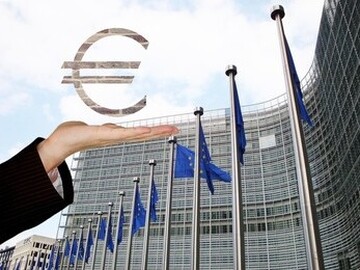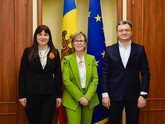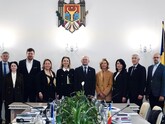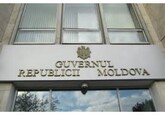
The European Commission is accepting applications from private companies to express their interest in investing in Moldova
The European Commission previously announced a call for proposals for companies from the EU, the European Economic Area, and Moldova to identify specific investment opportunities in the Moldovan economy. The main goal of the initiative is to facilitate a structured dialogue between the European Commission and the private sector to analyze Moldova's investment potential, identify existing barriers to investment, and develop a portfolio of projects that could benefit from the political, technical, and financial instruments offered by the European Commission. The deadline for applications for the first call is December 8. Applications submitted later will be assessed tentatively in March and June 2026. According to the European Commission, Moldova is laying the foundation for integration into the EU single market – not only through legal alignment but also through the modernization of infrastructure, energy systems, digital services, institutions, and the agrifood sector. These efforts are not isolated reforms, but rather part of a strategic goal: to position Moldova as a future EU member and a key link in European economic and logistics networks. Until now, support for private sector development has focused on ensuring access to finance for SMEs, but now it will be complemented by a strategic approach aimed at attracting and supporting strategic investors. Moldova offers direct infrastructure links with Romania and Ukraine, free access to the EU market, and a skilled labor force. The government is committed to creating a rules-based and business-friendly environment, supported by technical and financial instruments to support investment. As part of the Moldova Development Plan and the EU-funded Reform and Growth Facility, the country will implement over 150 reforms by 2027, aimed at increasing competitiveness, simplifying procedures, and aligning the Moldovan economic system with EU standards. Over 80% of entrepreneurs interact with the government digitally, and over two-thirds of government services for businesses (e.g., permits, tax, and customs duties) are digitized. This digital transformation is underpinned by high-performance infrastructure. The country boasts 90% gigabit internet coverage, 86% fixed broadband coverage, and 89% mobile broadband coverage. Furthermore, Moldova is positioning itself as a regional digital leader. The single tax regime for IT companies has been extended until 2035, supporting the sector, whose contribution to GDP now exceeds 7%, placing Moldova 7th in Europe in terms of ICT share and surpassing several traditional industries. Moldova has launched a new state support program for industrialization to support high-value-added manufacturing. At the same time, multifunctional industrial platforms are being developed to attract investment and facilitate the integration of value chains. To further optimize investment processes, the government will implement a national Investment Map and create a specialized comprehensive service center for strategic projects. Moldova is strengthening its role as a strategic logistics hub. The multimodal terminal in Beresti near Ungheni, just 5 km from the Romanian border, is expected to become the country's first large-scale logistics platform, capable of handling both broad-gauge and European-gauge railcars and accommodating up to 200,000 trucks per year. Once operational, the terminal will strengthen the country's integration into European transport and logistics chains. At the same time, the country is modernizing key rail and road corridors of the TEN-T network. A special program is also being implemented to rehabilitate key bridges and border infrastructure essential for trade and safe mobility. A feasibility study for the Ungheni–Chisinau–Odessa highway is expected by the end of 2025. Finally, air connectivity is also being improved. In 2024, passenger traffic at Chisinau Airport increased by 46% compared to 2023, and Marculesti Airport is being transformed into a regional hub for cargo and seasonal passenger flights. In the energy sector, Moldova is striving to achieve a higher degree of energy sustainability, energy security, and self-sufficiency and is taking concrete steps toward integrating with the European market. The country is preparing for electricity market integration with the EU, facilitated by the construction of three 400 kV interconnectors with Romania and synchronization with ENTSO-E. Support for major infrastructure projects, such as the interconnector with Romania and the development of stable generation capacity, will be strengthened through the implementation of an investment portfolio financed by the EU and international financial institutions. Moldova is advancing an ambitious renewable energy development program, simplifying permitting procedures and accelerating investment in solar, wind, and biomass energy. These efforts are complemented by reforms to unbundle the gas sector, modernize storage infrastructure, and ensure transparent market operations. Efforts to strengthen competition policy and reform state-owned enterprises (SOEs) are ongoing, aimed at privatizing a number of companies and continuing corporate governance reform and restructuring other SOEs. Moldova is upgrading the skills of its workforce, including through improved vocational education and training. The country is also making progress in expediting judicial procedures and improving access to justice. Financially, Moldova joined the Single Euro Payments Area (SEPA), a key step toward deeper financial integration with the EU. Moldova is also striving to develop its capital market and is preparing to list on the Bucharest Stock Exchange, planning to create a unified market infrastructure that will facilitate the integration of Moldova's capital market with EU standards. The EU, as noted, has a number of instruments that can facilitate private sector investment in Moldova. In particular, the European Fund for Sustainable Development Plus (EFSD+) offers certain risk mitigation options through budget guarantees to partner international financial institutions and development banks, as well as, where necessary, grants for investments with a broader public interest. In particular, EU guarantees facilitate the provision of loans or other financing for investment projects on favourable terms by international financial institutions, development banks, and private co-investors. EU guarantees can support various forms of financing, including debt, equity, and portfolio guarantees for bank lending to the private sector. Furthermore, the EU also funds technical assistance for investment preparation. In this context, the European Commission is launching a call for expressions of interest from EU/EEA/Moldova businesses to invest in Moldova, in line with the EU's strategic areas of interest and policy priorities. The aim of this call for expressions of interest is to establish a dialogue with private companies regarding specific investment opportunities and related constraints in Moldova. Based on the relevant evaluation criteria, follow-up contacts with partner financial institutions can be facilitated for potential financial cooperation. This dialogue aims to generate a flow of transformative private investment in Moldova, which could potentially be supported by the European Commission using its available instruments. This call invites companies from the EU/EEA and Moldova to submit project proposals for new investments in the real sector of the Moldovan economy. Participation in the call does not imply any form of partnership, joint venture, or other legal relationship between the participant and the European Commission. It does not guarantee financial assistance from the European Commission or any partner financial institutions. The publication of this call for expressions of interest also does not commit the EU to funding the investment project proposal. All project proposals submitted to the European Commission will be assessed based on the criteria set out in this call and will be treated equally, ensuring a fair and transparent evaluation process. All information provided in the project proposal will be treated confidentially and will be used solely for the purpose of evaluating the proposals in accordance with the criteria set out in this call. The priority areas of the competition will be based on the Growth Plan and Strategic Directions of the European Fund for Sustainable Development Plus (EFSD+), identifying key sectors of the real economy requiring investment, including, among others: energy and green transition; agriculture, agri-food industry and rural development; advanced manufacturing and industrialization; information technology, digital innovation and applied research; infrastructure and communications: transport, logistics and digital systems; healthcare, innovation in the field of digital health. Projects must meet the established minimum investment threshold, including the total investment project size of €10 million and the promoter's own participation in the amount of 15% of the total investment project value. Strategic, financial and impact criteria will be used to evaluate the project's investment proposal. // 31.10.2025 — InfoMarket







